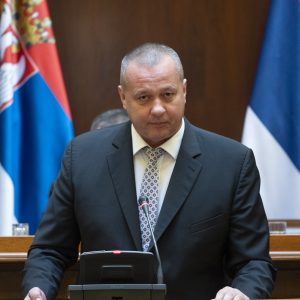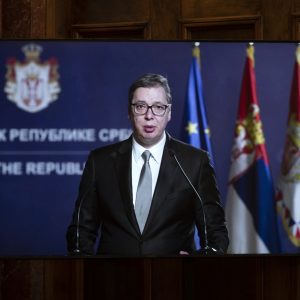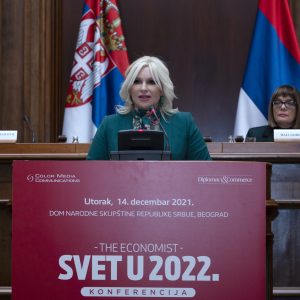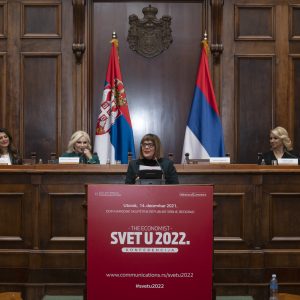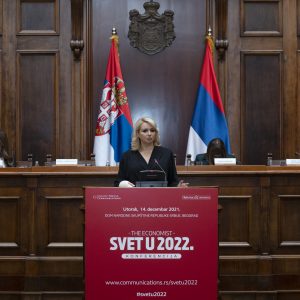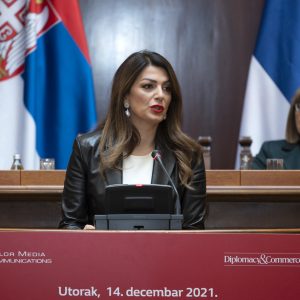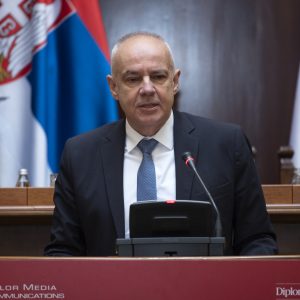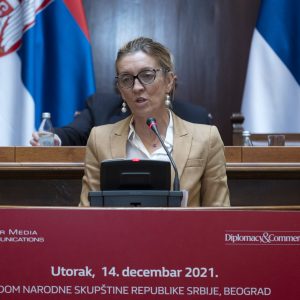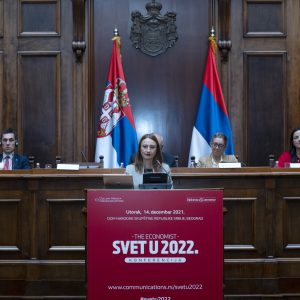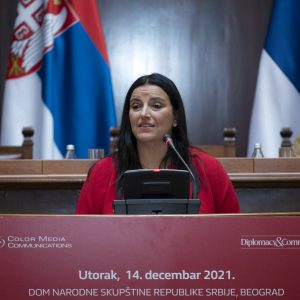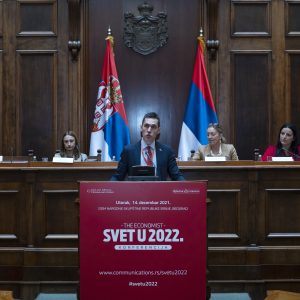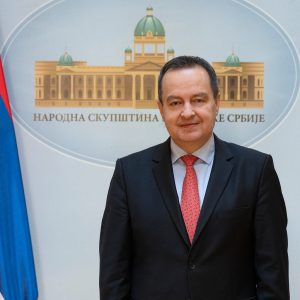Serbia expects economic growth to continue next year
The annual The Economist ‘World in 2022’ conference was officially opened in the small hall of the National Assembly of Serbia. This is one of the oldest conferences organized by Color Media Communications and has already become recognized as an event that closes the current year with conclusions about the political, business and social environment of Serbia and discusses important issues in the coming year. As every year, key people, the highest state and international officials gave their conclusions and projections on the upcoming period at the opening.
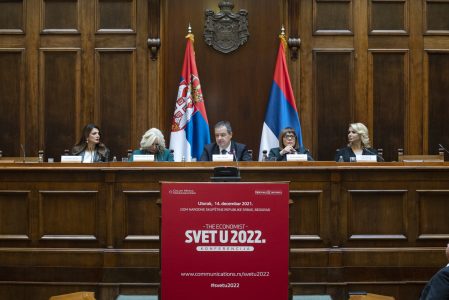
Robert Čoban, president of Color Press Group
No crisis is stronger than a powerful brand like The Economist
As the conference organizer, Robert Čoban, president of Color Press Group, pointed out at the opening that the strength of a brand like The Economist persists in uncertain times such as the ongoing COVID-19 pandemic. He reminded that the first licensed edition of The Economist magazine in Serbia was published in 2009, at the very beginning of the world economic crisis, that this year it was the 12th edition, and that apart from Serbia, this magazine was published in five countries in the region.
Mr Čoban also explained that “no crisis is stronger than a powerful brand like The Economist, which testifies that industry and business cannot be stopped under any circumstances.” He also announced the officials who spoke at the conference about the economy and the challenges that await the world in the year 2022.
Ivica Dačić, Speaker of the National Assembly of the Republic of Serbia
Serbia is giving a strong and best possible response to the crisis
The participants of the conference and those gathered were greeted by Ivica Dačić, Speaker of the National Assembly of the Republic of Serbia, who said that he expected full stability to return next year, which is a necessary prerequisite for development in every sense.
“A year ago, Serbia gave and is still giving a strong and best possible response to the crisis that was caused by the COVID-19 virus, when it comes to protecting the health of the population, and especially when it comes to preserving economic potential. There are very few countries that can boast that they have provided their population with sufficient quantities of free vaccines from all major global manufacturers from the moment there were first available. Only very few countries were able to open facilities for the vaccine production, as Serbia did with Sputnik, and which it will do next year with Sinopharm.
If in the year of the pandemic, such were this and the previous one, we managed not only to maintain but also to increase the rate of economic growth and continue the record regional results in terms of foreign investments, and further boost the construction of infrastructure, then it is clear what the year 2022 could look like, the year when the pandemic will hopefully be on the wane. That is a realistic expectation, which is based on the parameters from this and previous years and on the budget that we recently adopted here, in the Parliament.”
Aleksandar Vučić, the President of the Republic of Serbia
We have the challenges of energy transition
The President of the Republic of Serbia, stated that we are going to start the year 2022 with the ongoing pandemic which brings new challenges to humanity. In his address, he explained that the big problem is that energy has become a new battlefield, both for the superpowers and for the regions. “Energy is no longer available at cheap or reasonable prices that everyone can use, but it is becoming a powerful weapon. Next year, we expect a global increase in energy consumption, due to the growing needs of the economy. On the other hand, we have the challenges of energy transition that require a reduction of pollutants. Increased demand for energy will drive up prices.
We will continue to monitor the development of alternative fuels, such as green hydrogen, which is still quite expensive to produce. However, countries such as China or the EU have already announced investments to decrease the price of this fuel in the future. Serbia is entering 2022 with sound public finances, surrounded by relatively favourable global macroeconomic conditions.
Just like today, Serbia will remain a reliable partner to all relevant international institutions whose actions are aimed at creating harmonious relations between nations. Here, I’m primarily referring to the promotion of political and economic multilateralism defined through the United Nation’s current agendas. Our future, as well as the future of the planet, is facing risks, but I am quite confident that we will be able to amortize their consequences to start off with, and then continue to build a brave new world.”
Zorana Mihajlović, Deputy Prime Minister and Minister of Mining and Energy
Energy and climate security are the biggest challenges ahead
The Minister Mihajlović explained that “every state must know what it wants to achieve in 10, 20 or 30 years. Energy is not an issue that can be solved in one day or one year. Serbia wants to be decarbonized in 2050. Realistically speaking, it cannot achieve that earlier, but in the decades ahead of us, Serbia must take certain steps in order to create enough capacity and energy, and for that energy to be clean. That is why Serbia passed very important laws this year. It has completely changed its legislative framework. So, in addition to the standard ones, such as the Law on Energy and Law on Mining, Serbia also passed the Law on Renewable Energy Sources for the first time. Serbia has also passed a completely new Law on Energy Efficiency and Rational Use of Energy.
Furthermore, Serbia has set strategic goals and publicly presented its national energy and climate plan. We will propose ways in which we can have enough energy and keep it clean. Investing in renewable energy sources, raising energy efficiency and building completely new capacities require huge investments. But they are not an obstacle but a basis for further economic development.”
Maja Gojković, Deputy Prime Minister and Minister of Culture and Information
Novi Sad is the first European capital to win awards in all categories
Maja Gojković, Deputy Prime Minister and Minister of Culture and Information, pointed out that “culture, in addition to the economy, was hard hit by the pandemic and its consequences, but regardless, these challenges have awakened creativity in people involved in culture and forced artists to turn to some other forms of creativity and find their way to the end-user and audience, such as online communication and providing cultural content.
Our Ministry’s strategic priorities clearly recognize the value and importance of additional investments in culture and encouraging innovation, because, in this way, these investments provide a return to the state many times over. The 2022 budget of the Ministry of Culture and Information has been increased by two billion dinars or 16 percent. I am especially proud to say that we have managed for culture allocations to exceed 1% of the total state budget.
The year ahead will be remembered thanks to three key projects with one of them being Novi Sad European Capital of Culture 2022, a project that starts on 13th January. Novi Sad is the first European capital to win awards in all categories. The second is the City of Čačak getting ready to become the first capital of culture in Serbia which will significantly contribute to the decentralization of culture. The third is the Towns in Focus project which is also closely related to decentralization.”
Darija Kisić Tepavčević, Minister of Labour, Employment, Veteran and Social Affairs
New jobs have been created
Darija Kisić Tepavčević said that Serbia was among the first countries to have anti-COVID vaccines available.
“It will soon be a year since the first vaccine was administered in our country, and I would like to appeal once again to all those who have not been vaccinated, to do so in order to create immunity.
We fought very successfully with the challenges that were in front of us. In 2021, we have managed to attract foreign investments and create new jobs, despite the difficult circumstances. There are very positive indicators related to the labour market. At this difficult time, new jobs have been created, a total of 60,000. The number of unemployed persons has also decreased compared to previous years.
Programmes, such as ‘My First Salary’, were also implemented this year. Over 9,000 young people were employed thanks to this programme and about half of them remained working for the same employers. Since it was a success, the programme has been re-launched.
This year we have changed many laws, and for the first time, we have the Social Security Card Law. We are working very hard to fully enable and develop this system. The Law on Work Practices and the Law on Volunteering will also help us a lot with youth employment.
We are also continuing to implement Serbia without Barriers campaign, which entails a dozen daily activities. I hope that our activities demonstrate that Serbia is certainly on the path to progress and that there are no barriers for Serbia in that sense.”
Tatjana Matić, Minister of Trade, Tourism and Telecommunications
We are looking forward to the end of this year with very good results
Tatjana Matić said that, above all, the rapid procurement of vaccines helped the tourism sector in Serbia to stand on its own two feet. “Despite all the problems and challenges, we are looking forward to the end of this year with very good results. So far, we have had over two million tourists in Serbia, with over 10 million overnight stays and foreign revenue from tourism of 1,150,000,000 euros which is close to the results from 2019, a record year for Serbian tourism.
Ten days ago, at the General Assembly meeting of the World Tourism Organization in Madrid, Mokra Gora was declared the most beautiful village in the world, while Serbia was ranked among the 22 best destinations to visit in 2022. The Michelin guide has included 14 restaurants from Belgrade in the publication, which is also a validation of the top-notch tourist and gastronomic offer.
The domestic commerce sector has managed to maintain a continuous and timely supply to the population. There has also been an increase in the number of employees in this sector. This year, we can also boast about external trade in goods, which value increased by almost 25 percent compared to the same period last year. We expect external trade to grow the next year as well. There was also a big jump in e-commerce in the Republic of Serbia, which would not have been possible without a developed telecommunications network.
Many projects have been launched to reduce the digital divide between urban and rural areas. One of them is connecting all schools in Serbia to the Internet through the Republic of Serbia’s academic network.”
Zoran Radojičić, the mayor of Belgrade
My vision of Belgrade is that the city will be built to suit children
Zoran Radojičić, the mayor of Belgrade, said that “the year behind us has shown that we must constantly adapt to the challenges that lie ahead, but we must be proud of the results that Serbia and the City of Belgrade have achieved in the past which showed that Belgrade is an investment hub in this part of Europe.
All the projects that Belgrade is implementing show that we are thinking about the future of our citizens, as well as how to improve the quality of life and health of all of them. For the coming years, it is important to develop tourism as dynamically as it was until 2019. Digitalization is an important way of developing Belgrade as one of the major capitals, as is the development of the IT sector and keeping young people in the country.
My vision of Belgrade is that the city will be built to suit children, so our children, when they grow up, will have a city and country in which they will be able to create and work on developing the country further. We will continue to work on the development of urban mobility and sustainable development. I am confident that science, innovation, technology and the digital economy are the future. These are areas in which we must invest and give as much space as possible to young and educated people who are the future of Serbia. Big cities will expand in the coming period and the future of the world will probably be in the hands of big cities, which will make local governments even more important. The future of big cities lies in a flexible reaction to the crisis situations that will, unfortunately, happen in the future too.”
Françoise Jacob, the UN Resident Coordinator in Serbia
Climate change is becoming an increasingly current issue
Françoise Jacob, the UN Resident Coordinator in Serbia, said there are five key areas that this institution will focus on. “Health care must be the main focus of governments and viewed as an investment, not as an expense. The future of work lies with real people doing their jobs, such as agriculture, tourism, sales and crafts. Sustainable demography is also a very important topic. Climate change is becoming an increasingly current issue, with Serbia making its first steps toward change in that segment by adopting the Green Agenda. The last but not least crucial area is the rule of law. The UN will continue to work on improving the system at the local and state level, with the promotion of science and knowledge becoming the most important activity.
The UN will also continue to support a strong preventive health strategy, the full implementation of dignified work programmes and a comprehensive package of activities aimed at building demographic resilience. We call for the implementation of a strong vision of the Green Agenda and the strengthening of the governance system. We will continue to provide free civic and media space, and remain standing firm against any kind of speech that causes divisions and hatred while continuing the fight against inequality.”
Deyana Kostadinova, Director of UNICEF in Serbia
UNICEF is celebrating its 75th anniversary
Deyana Kostadinova, Director of UNICEF in Serbia, stated that UNICEF is celebrating its 75th anniversary and that the organization was founded immediately after World War II, during a crisis that engulfed children worldwide. She added that significant progress has been made in all segments, but that the COVID-19 pandemic set back achieved progress, both in social protection and education, but also in health, thus increasing poverty.
“Today, we must re-imagine a world and Serbia that will be tailor-made to children in 2022, and try to turn the situation around. It is not about reverting to the pre-pandemic state, because even then too many children were marginalized, without any opportunities. In order to create an equal future for children in Serbia and help them to become their best, we must start by investing in them from their earliest age. The Serbian government has already started working on some of the indicators.
Fair investments will prevent growing inequalities that can threaten the economic development and security of any country. The activities that are being undertaken and the policies that are being adopted today will determine whether children in Serbia will face inequalities and marginalization in the future or reach their full potential, and thus contribute to the economy and a stronger Serbia,” the UNICEF director concluded.
Francesca Bonelli, Representative of UNHCR in Serbia
Everybody benefits from the inclusion of refugees
Francesca Bonelli, Representative of UNHCR in Serbia, said that the number of people displaced by force in the world is increasing every year and that by mid-2021, that number exceeded 84 million. She pointed out that the main misconception that needs to be eliminated is that refugees represent a burden for the economy of the country they come to, adding that the facts show a completely different situation.
“Global economic data undoubtedly indicate that everybody benefits from the inclusion of refugees – both refugees and the country in which they seek asylum. On the contrary, both groups are usually complementary to each other and are not jeopardizing each other in any way. This is an important message that should be especially highlighted today when we are marking the 70th anniversary of the 1951 Refugee Convention,” Ms Bonelli explained.
She added that there is no better place than Serbia, which has shown a high degree of solidarity and compassion for refugees and congratulated the local authorities on that. “In this way, refugees are given the opportunity to contribute to society in the best possible way, because they are represented in all professions, from athletes, through lawyers to doctors. Some refugees have even become ministers,” the head of the UNHCR office in Serbia said in her address.
Alessandro Bragonzi, the head of the EIB’s regional office for the Western Balkans
Changes that are both opportunities and challenges
Alessandro Bragonzi, the head of the EIB’s regional office for the Western Balkans, stated that the world is facing changes that are both opportunities and challenges in a situation rife with shortages, and increased prices of raw materials, energy and transportation. The spread of a new COVID strain has cast a shadow over the economic recovery and threatens to delay a return to normalcy in 2022. At the same time, he underlined that we are in the week when the world banks will decide on interest rates, affected by inflation.
He explained that “in Serbia, the European Investment Bank continues to finance key infrastructure projects and help develop the private sector.” “At the same time, we support the development of technology by investing in innovative companies, research and development, education and digital transformation. This includes 135 million euros allocated to the digital sector and close to 400 million euros for small and medium-sized enterprises. All in all, a total of 570 million euros were earmarked for Serbia during the two-year-long pandemic. We are proud to have helped in the implementation of successful projects in Serbia, which sets a good example for the entire region. We look forward to new partnerships, initiatives and opportunities that will help us achieve even more. Also, our priorities are related to expediting the EU accession process,” Mr Bragonzi concluded.
